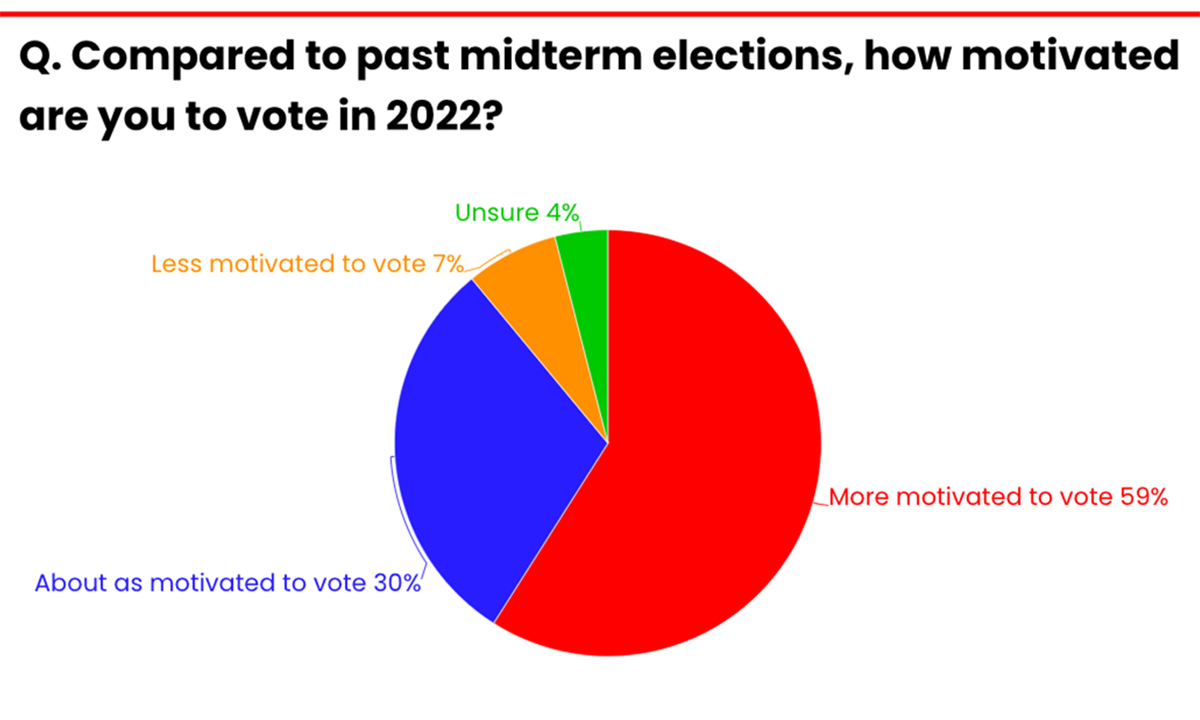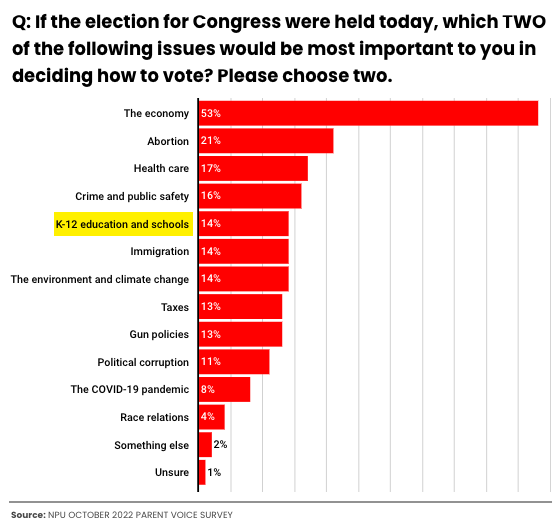More Parents Motivated to Vote in Midterms, Poll Finds
But the big issue galvanizing them is the economy, not education

Get stories like this delivered straight to your inbox. Sign up for The 74 Newsletter
A majority of parents are more likely to vote in the upcoming midterm elections than they were four years ago, a new poll shows. But the economy, far more than education, is the issue driving them to the polls.
While 82% of parents said they are very or extremely likely to vote in the election, just 14% called K-12 education a top concern — well below the economy (53%) and slightly behind abortion (21%) and health care (17%).
Keri Rodrigues, president of the National Parents Union, the advocacy group that sponsored the poll, said the numbers reflect parents’ hunger for change.
“We have moved into a position where we’re not going to be ignored,” she said. “We’ve seen too much.”
Last spring, experts began seeing that parental outrage over closed schools, COVID protocols, and district handling of race and gender issues had given way to more immediate concerns about groceries and rent. While almost two-thirds of parents say the quality of their local schools still affects their family, 86% are more troubled by “the rising cost of everyday purchases.”

“It’s understandable that inflation would dominate voter concerns since they encounter it every day,” said John Bailey, an advisor to the Walton Family Foundation and a fellow at the conservative American Enterprise Institute. “These extra costs will crowd out other spending for the kids like afterschool programs and summer camps.”
Just a third of parents said they know a lot about where House and Senate hopefuls stand on education. In fact, they’ve heard less about schools than any other topic.
That doesn’t mean that parents no longer care about politicians’ plans to improve schools. On poll questions related to education, Rodrigues noted that fewer parents are blaming the pandemic for low academic performance. They are more focused on fundamental questions about whether schools can prepare students for the future and deliver an adequate education.
“The tide is turning,” she said.
Sixty-two percent of parents said they are very or extremely concerned about schools’ ability to provide quality teaching and instruction, compared with 55% who feel that way about schools’ handling of learning loss.
Congressional candidates might not be talking about education, but it’s still a prominent issue for gubernatorial candidates, with Republican incumbents such as Florida’s Ron DeSantis and Oklahoma’s Kevin Stitt blaming Democrats and their union supporters for long school closures, mask mandates and classroom lessons they say confuse students about race and gender. They’ve sought to portray themselves as the party most concerned with parents’ rights.
At least one organization is drawing attention to conservative policies some Republicans have proposed or supported, such as banning transgender students from participating in sports and restricting what students read in school. Last week, Campaign for Our Shared Future, a nonpartisan group, announced it’s spending $300,000 on ads in Ohio, Pennsylvania and Missouri.
The Pennsylvania ad focuses on a district banning books and the Missouri spot calls out a school board member for comments about transgender students and students with disabilities. But the Ohio ad denounces a bill that would require female athletes to undergo a genital inspection if they were suspected of being transgender. Following a backlash, lawmakers promised to remove the language. The state board of education is also considering a resolution urging districts not to comply with the Biden administration’s plans to extend federal protections against discrimination and harassment to transgender students.
“Across the country, families and students are being failed by extremist politicians who care more about pushing divisive culture wars than providing a high quality age-appropriate education,” Heather Harding, the organization’s executive director, said in a statement.
‘Indifferent and unresponsive’
The campaign was formed to combat efforts by groups such as Moms for Liberty and the 1776 Project PAC, which have mobilized to elect conservative school board members. And over the summer, polls suggested that Republicans were gaining an edge with voters on education.
But this latest survey — based on a sample of 1,022 registered voters with school-age children — shows Democrats could be regaining voters’ trust as the disruptions of the pandemic slowly fade.
Forty-one percent of respondents said they have more faith in Democrats to handle the challenges facing K-12 schools, compared to 29% who chose Republicans. Rodrigues said those earlier polls didn’t focus specifically on parents. Even if they don’t always approve Democrats’ decisions, if the question is who parents think can “take us into the future on education, Democrats still have that lead,” she said.
The overall sample of parents leans to the left, with 51% saying they would probably or definitely vote for Democrats and 40% choosing Republicans.
But a year ago, that might have been different, Bailey said.
“This time last year, parents were still juggling school quarantines, which in some ways were more disruptive than school closures,” he said. Either way, a “common theme is that parents are frustrated by a system they think is indifferent and unresponsive to their needs.”
Disclosure: John Bailey is an adviser to the Walton Family Foundation, which provides financial support to The 74.
Get stories like these delivered straight to your inbox. Sign up for The 74 Newsletter

;)
